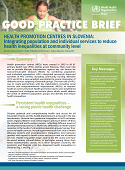Health promotion centres in Slovenia: Integrating population and individual services to reduce health inequalities at community level (2018)

Download
Health promotion centres (HPCs) were created in 2002 in all 61 primary health care (PHC) centres across Slovenia. Their main role was to provide lifestyle interventions against key risk factors for noncommunicable diseases (NCDs) by combining population and individual approaches. HPCs integrated previously dispersed activities in PHC centres, including community nursing.
Between 2013 and 2016, a new paradigm was piloted to assure integration of different services targeting vulnerable groups. The new role of HPCs was to create partnerships with key stakeholders, including social services and nongovernmental organizations (NGOs), to improve health at community level. Health promotion teams were established to prepare local strategies and actions plans, which would address the needs of different population groups and identify and reduce health inequalities.



